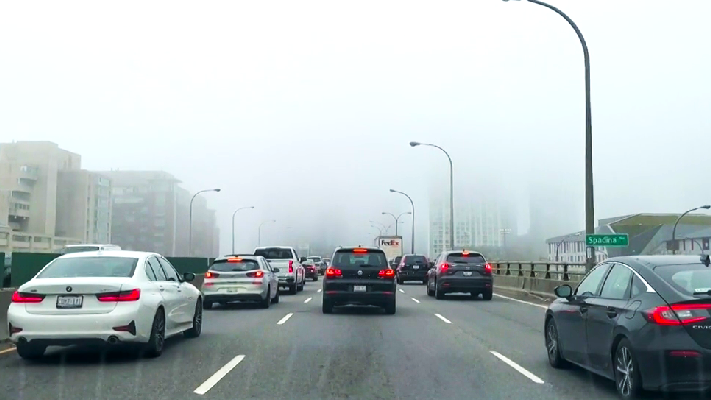A blow to business: Gardiner lane restrictions undercut productivity in costly commute
In the second of a three-part series on Gardiner Gridlock, CTV Toronto examines the impact of the latest round of expressway construction on businesses losing time and money contending with the congestion.
PART 1: 'It's just been a nightmare': Gardiner restrictions are Toronto's traffic tipping point
Klea Mosho is well-used to spending time behind the wheel of her little white Civic – she lives in Mississauga, Ont., and drives the GTA daily as part of her job as a rehabilitation therapy assistant.
Her typical workday involves visiting clients in their homes, helping them recover from severe injuries.
“The relationship-building part is, I’d say, the first and most important step to having a successful work with the clients,” Mosho told CTV News Toronto in an interview. “And once we get used to them and they get used to us, it is important to continue your relationship and the work that you're doing.”
But after months of providing support services to clients with whom she has built trust, Mosho is finding it increasingly difficult to keep up her caseload. Ever since the latest round of Gardiner construction reduced the stretch between Dufferin St. and Strachan Ave. to just two lanes each way, her time spent sitting in traffic has spiked.
“It has definitely made it challenging to see multiple clients in a day,” Mosho said. “It has made it difficult not only to get to the clients who reside in downtown Toronto, but also in other areas nearby.”
 Klea Mosho speaks to CTV News Toronto.
Klea Mosho speaks to CTV News Toronto.
It is a reality that the staff at her Burlington-based company are now facing across the board. The lane closures on the vital artery into the 416 have put some support workers in a position where they have to turn down requests from downtown Toronto clients, because they can’t get there in a reasonable amount of time.
“The way that we navigate the city and outlying regions vastly impacts how much cost there is to doing business,” said Sean McGhie, service director for Anchor Rehabilitation Support Services.
“While we are always trying to cluster or bring together clients so that it's the most efficient possible for our team, sometimes that's not a reality. When your basic roadways are constricted to this degree, there's simply no solution for us to work around that.”
The company is among hundreds across the GTA forced to pivot around the problem: the 30-per cent cut to capacity on the 700-metre stretch of expressway that has jacked travel times in a hit to commercial productivity. The timeline for the closure is a whopping three years – necessary, according to the City, in order to replace the elevated surface of the aging Gardiner and fix the supporting structures underneath.
But the extra time and cost imposed on business as a result of that work worries the head of the Toronto Region Board of Trade.
“Investors look at Toronto and they see all of this congestion, and the difficulty of mobility. Not just getting people moved around, but getting goods and services moved around. And so they basically take a pass and invest somewhere else,” Giles Gherson said.
“We're going to be at risk of losing a lot of our jobs internationally,” Travis O’Rourke, president of recruitment firm Hays Canada, told CTV News Toronto.
As more millennials move outside the core, and a return-to-the-office push makes fully-remote jobs fewer and more far between, top talent is turning down jobs that involve sitting in hours of traffic a day.
“I know when I'm driving to work, and you get hit with that traffic, it's construction season in Toronto, you start to think, ‘maybe there is a job that's closer to home. Why do I do this every day? I'd rather be with my kids,’” O’Rourke said.
 Travis O’Rourke, president of recruitment firm Hays Canada. (CTV News)
Travis O’Rourke, president of recruitment firm Hays Canada. (CTV News)
The Gardiner gridlock, he adds, is just another reason for big business to reconsider planting roots in the core.
“People are asking themselves, ‘If I'm going to move my location outside of downtown Toronto, why would I keep it in Ontario? Ontario isn't proving to be the most corporate tax-friendly location. So Alberta is starting to look very good. Maybe I'll open up in Alberta!’”
Toronto Mayor Olivia Chow, though, disagreed that business is going elsewhere as a result of the gridlock.
“Actually, no, Toronto is growing,” Chow said. “There are businesses that are expanding and we are increasing public transit, we are fixing the infrastructure.”
But those infrastructure improvements can come at a cost beyond the capital, others argue: a blow to business while the traffic is snarled, and an impact on the people who depend on the services that have been stalled by the slowdowns.
“I am working with less clients now, and I've had to make accommodations for some of them,” Mosho said.
“By my count, there’s 1,065 days left of this challenge, and that is a very long time,” McGhie said. “This is really something that, if we don't find a solution for it … we are in a position where our clients are really going to deteriorate.”
In Part 3 of Gardiner Gridlock, CTV Toronto will examine what more can be done to alleviate the impact of the construction on the commute.
 The Gardiner Expressway can be seen above. (Natalie Johnson)
The Gardiner Expressway can be seen above. (Natalie Johnson)
CTVNews.ca Top Stories

W5 Investigates A 'ticking time bomb': Inside Syria's toughest prison holding accused high-ranking ISIS members
In the last of a three-part investigation, W5's Avery Haines was given rare access to a Syrian prison, where thousands of accused high-ranking ISIS members are being held.
'Mayday!': New details emerge after Boeing plane makes emergency landing at Mirabel airport
New details suggest that there were communication issues between the pilots of a charter flight and the control tower at Montreal's Mirabel airport when a Boeing 737 made an emergency landing on Wednesday.
Federal government posts $13B deficit in first half of the fiscal year
The Finance Department says the federal deficit was $13 billion between April and September.
Canadian news publishers suing ChatGPT developer OpenAI
A coalition of Canadian news publishers is suing OpenAI for using news content to train its ChatGPT generative artificial intelligence system.
Weather warnings for snow, wind issued in several parts of Canada
Winter is less than a month away, but parts of Canada are already projected to see winter-like weather.
BREAKING Supreme Court affirms constitutionality of B.C. law on opioid health costs recovery
Canada's top court has affirmed the constitutionality of a law that would allow British Columbia to pursue a class-action lawsuit against opioid providers on behalf of other provinces, the territories and the federal government.
Cucumbers sold in Ontario, other provinces recalled over possible salmonella contamination
A U.S. company is recalling cucumbers sold in Ontario and other Canadian provinces due to possible salmonella contamination.
Nick Cannon says he's seeking help for narcissistic personality disorder
Nick Cannon has spoken out about his recent diagnosis of narcissistic personality disorder, saying 'I need help.'
Real GDP per capita declines for 6th consecutive quarter, household savings rise
Statistics Canada says the economy grew at an annualized pace of one per cent during the third quarter, in line with economists' expectations.

































